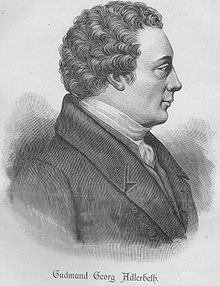Gudmund Jöran Adlerbeth
Gudmund Jöran Adlerbeth (born May 21, 1751 in Jönköping , † October 7, 1818 on Ramsjöholm ) was a Swedish statesman, scholar and poet.
Life
Gudmund Jöran Adlerbeth was the eldest son of an assessor at the Gotland High Court . He gave up his office soon after the birth of his son in order to be able to devote himself entirely to his upbringing. Adlerbeth then studied from 1768 to 1771 at Uppsala University . In 1770 he was accepted into the literary society Utile dulci . He joined the royal chancellery in 1771, where he worked for warfare and foreign affairs. In 1778 he became the imperial antiquarian and private secretary of King Gustav III. appointed. In 1783 he accompanied the monarch to Rome , where he stayed until 1785. After returning to his homeland, he became one of its first members when the Swedish Academy was founded in 1786 and in the same year secretary at the Royal Academy of Scholarship, History and Antiquities and in 1788 also a member of the Royal Academy of Sciences , which he subsequently twice as president. In 1787 he was appointed chancellery, in which position he remained until he temporarily resigned from civil service at his own request in 1793.
After that, Adlerbeth lived on his estate as a farmer. In 1801 he was appointed commander of the North Star Order by Gustav IV . When Gustav IV was overthrown by a revolution in 1809 and Charles XIII. was made the new king, the Reichstag elected Adlerbeth as a member of the constitutional committee, and he participated in the revision of the basic imperial laws. Then he was made a Councilor of State, made a baron and shortly thereafter made a Knight of the Order of the Seraphines . He was also a knight of the royal order of Charles XIII. , The Freemasons is reserved. From 1815, in which year he retired to Småland , giving up all state offices , he only lived literary work until his death on October 7, 1818 at the age of 67. His son Jakob Adlerbeth (* 1785; † 1844) was an archaeologist and the actual founder of the literary union Götiska Förbundet .
plant
Adlerbeth created an extensive literary oeuvre. He wrote tragedies (which, however, did not acquire any great importance) and operatic texts with ancient material based on the model of French authors such as Racine and Voltaire . Two of his dramas, Ifigeni i Auliden and Fedra och Hyppolyt , are translations of Racine. He was given to King Gustav III. Introduced in 1773 by the Count of Gyllenborg , one of the best Swedish poets of the time, and presented the monarch with a copy of his translation of Racine's Iphigénie en Aulide . Thereupon Gustav III transferred. him and Gyllenborg the drafting of the play Birger Jarl , for which the king himself had drafted. Another tragedy that Adlerbeth created in 1799 based on a Swedish motif is entitled Ingiald Illråda . His drama Kelonid (1802), set in Greece, was relatively successful . Adlerbeth's opera texts on ancient themes include Neptune and Amphitrite , Procris and Cephal and Amphion .
Adlerbeth was especially celebrated as the translator of several Roman poets; so he transferred all the works of Virgil , the Metamorphoses of Ovid and the odes, epodes and satires of Horace into Swedish. In this area he was partly a student of Johann Heinrich Voss . He was the first to systematically present the Swedish metric; also the first to draw attention to old Icelandic poetry in Sweden. His significant, but not always objective memoirs ( Historiska anteckningar ) appeared after his death (edited by Gustaf Andersson, 3 vols., 1856f .; new edition by Elof Tegnér, 1892f.).
literature
- Adlerbeth, Gudmund Jöran . In: Gero von Wilpert (Ed.): Lexikon der Weltliteratur , 3rd edition, Alfred Kröner Verlag, Stuttgart 1988, ISBN 3-520-80703-3 , p. 13.
- Agne Beijer: Adlerbeth, Gudmund Jöran In: Svenskt biografiskt lexikon , vol. 1 (1918), p. 106 ff. (Swedish)
| personal data | |
|---|---|
| SURNAME | Adlerbeth, Gudmund Jöran |
| BRIEF DESCRIPTION | Swedish statesman, scholar and poet |
| DATE OF BIRTH | May 21, 1751 |
| PLACE OF BIRTH | Jonkoping |
| DATE OF DEATH | October 7, 1818 |
| Place of death | Ramsjöholm |
